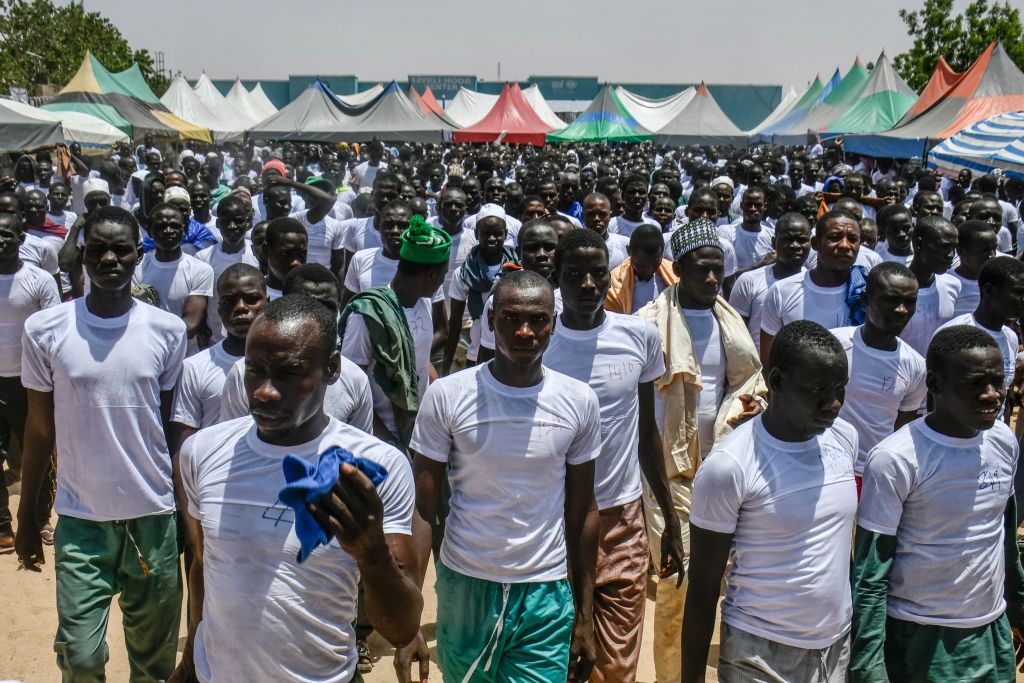ADF STAFF
Almost 600 former Boko Haram fighters swore an oath to Nigeria and apologized for their past actions during a ceremony in northern Gombe State.
The voluntary defectors were participating in a March 2023 graduation ceremony at a de-radicalization, rehabilitation and reintegration (DRR) camp after completing a six-month program known as Operation Safe Corridor. The program is advertised on radio broadcasts, and leaflets about it are dropped from the sky in areas where Boko Haram operates.
Besides persuading insurgents to lay down their weapons, DDR programs typically support former fighters and their families, often reintegrating them into society.
“Based on the therapeutic interventions these sets of clients have undergone, they’re better citizens from when they initially arrived at the DRR camp and accordingly are certified fit for graduation and subsequent reintegration to their respective communities,” program coordinator Uche Nnabuihe said in a Voice of America report.
Nigerian authorities started the program in 2016 to diminish the power of violent extremist groups.
Experts say there is a threat of recidivism among former terrorists, which is why it is important to understand why fighters choose to join — and leave — extremist organizations.
Protecting themselves and their loved ones, and finding employment are among the reasons people join extremist organizations, according to Malik Samuel, researcher at the Institute for Security Studies’ (ISS) regional office for West Africa, the Sahel and the Lake Chad Basin.
“You also have the conviction of joining jihad and the fact that they are fighting a holy war,” Samuel said during an ISS panel discussion that focused on successful ways countries can manage exits from armed groups. “You also have the family and peer influence and then, importantly, is the forceful recruitment in the forms of abduction and the threat of execution.”
Some members want to leave due to unfulfilled economic aspirations, disillusionment over a group’s dynamics and military campaigns against them, Samuel said.
A national and regional approach, through organizations such as the Economic Community of West African States (ECOWAS) and the Accra Initiative, to DDR is necessary to set the foundations of a DDR strategy “right from the beginning, considering bridges of collaboration and experience-sharing about national initiatives,” Samuel said.
“Such an approach would also permit more effective coordination of initiatives by international partners and in alignment with national and regional priorities,” he added.
Aliyu Ibrahim Gebi, coordinator of the Fusion Cell on Dialogue/Peace Process in Northeast, Northwest and North-central Nigeria, said it was necessary to offer a “golden bridge, the possibility that people would call people back into society, into the Nigerian fold” through Operation Safe Corridor.
“There’s also the component of de-programming, because these guys actually belong to a religious cult,” Gebi, who also is an advisor to the chief of defense staff on nonkinetic operations, said during the ISS discussion. “If you de-radicalize without de-programming, chances are that later in the future they will fall victim again to some central figure.”
Operation Zulu is another DDR program in Nigeria. The covert program led by Nigeria’s intelligence community targets mid- to high-level rebel fighters.
Through the program, fighters are told: “You are not defecting, you are not surrendering, but you are willingly coming out, because you want to make peace,” Gebi said. “That resonated with a particular layer of the group.”
Samuel, the ISS researcher, argued that communities should be actively involved in DDR decisions.
“Some communities in the Lake Chad Basin, particularly in Nigeria, have opposed the rehabilitation and reintegration of” former fighters, Samuel said. “There needs to be a system that matches the empowerment that [former fighters] receive during the DDR program with the benefit that communities receive, or should receive, because these communities have also been victimized.”
Mohammed Adamu is a former Boko Haram fighter who, in 2014, was captured by the group, along with his wife and four children. His story shows the difficult path necessary to reform and reintegrate former fighters.
“In the beginning, I liked their ideology, everything happening in God’s name,” Adamu told Al-Jazeera. “But soon, I realized that it was all about killing people. They just murdered without reason. So, I decided to run away.”
Boko Haram had already killed his family, he said.
Adamu completed the Operation Safe Corridor program and returned to his home near the Cameroonian border, but he said the stigma of being a former Boko Haram fighter made him an outcast.
“If I had known that I would be so rejected here, I would have stayed in the bush,” Adamu said.

